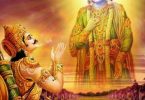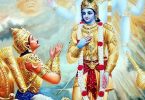Question: Were ksatriyas allowed to eat meat, in Vedic culture? If so, under what circumstances?
Answer by Romapada Swami:
Summary of Manu Samhita reference below:
In Vedic times, meat could be consumed only as a part of a sacrifice for the twice born. Manu Samhita proscribes eating meat otherwise. Brahmanas, ksatriyas and vaisyas undergo the process of upanayana, and therefore can be considered twice born. Sacrifice involves very strict rules regarding all the different items required for the sacrifice + qualified brahmanas for the sacrifice. Since the method of sacrifice is not the recommended process for the current age, primarily due to qualified brahmanas not being available, in Kali yuga meat eating is totally forbidden. From the references below, even in Vedic times, when possible animal sacrifice should be avoided.
In SB 10.51.62, Krsna says to Mucukunda: “Because you followed the principles of a ksatriya, you killed living beings while hunting and performing other duties. You must vanquish the sins thus incurred by carefully executing penances while remaining surrendered to Me.” This indicates that hunting also has consequences for Ksatriyas. See below: Ksatriyas can eat meat only after a sacrifice, not even from a hunting expedition for pleasure/learning battle skills (which was not pursued for a sacrifice).
Manu Samhita, Chapter 5 Reference
—–The sages, having heard the duties of a Snataka thus declared, spoke to great-souled Bhrigu, who sprang from fire:
2. ‘How can Death have power over Brahmanas who know the sacred science, the Veda, (and) who fulfil their duties as they have been explained (by thee), O Lord? ‘
3. Righteous Bhrigu, the son of Manu, (thus) answered the great sages: ‘Hear, (in punishment) of what faults Death seeks to shorten the lives of Brahmanas!’
4. ‘Through neglect of the Veda-study, through deviation from the rule of conduct, through remissness (in the fulfilment of duties), and through faults (committed by eating forbidden) food, Death becomes eager to shorten the lives of Brahmanas.’
5. Garlic, leeks and onions, mushrooms and (all plants), springing from impure (substances), are unfit to be eaten by twice-born men.
6. One should carefully avoid red exudations from trees and (juices) flowing from incisions, the Selu (fruit), and the thickened milk of a cow (which she gives after calving).
7. Rice boiled with sesamum, wheat mixed with butter, milk and sugar, milk-rice and flour-cakes which are not prepared for a sacrifice, meat which has not been sprinkled with water while sacred texts were recited, food offered to the gods and sacrificial viands,
8. The milk of a cow (or other female animal) within ten days after her calving, that of camels, of one-hoofed animals, of sheep, of a cow in heat, or of one that has no calf with her,
9. (The milk) of all wild animals excepting buffalo-cows, that of women, and all (substances turned) sour must be avoided.
10. Among (things turned) sour, sour milk, and all (food) prepared of it may be eaten, likewise what is extracted from pure flowers, roots, and fruit.
11. Let him avoid all carnivorous birds and those living in villages, and one-hoofed animals which are not specially permitted (to be eaten), and the Tittibha (Parra Jacana),
12. The sparrow, the Plava, the Hamsa, the Brahmani duck, the village-cock, the Sarasa crane, the Raggudala, the woodpecker, the parrot, and the starling,
13. Those which feed striking with their beaks, web-footed birds, the Koyashti, those which scratch with their toes, those which dive and live on fish, meat from a slaughter-house and dried meat,
14. The Baka and the Balaka crane, the raven, the Khangaritaka, (animals) that eat fish, village-pigs, and all kinds of fishes.
15. He who eats the flesh of any (animal) is called the eater of the flesh of that (particular creature), he who eats fish is an eater of every (kind of) flesh; let him therefore avoid fish.
16. (But the fish called) Pathina and (that called) Rohita may be eaten, if used for offerings to the gods or to the manes; (one may eat) likewise Ragivas, Simhatundas, and Sasalkas on all (occasions).
17. Let him not eat solitary or unknown beasts and birds, though they may fall under (the categories of) eatable (creatures), nor any five-toed (animals).
18. The porcupine, the hedgehog, the iguana, the rhinoceros, the tortoise, and the hare they declare to be eatable; likewise those (domestic animals) that have teeth in one jaw only, excepting camels.
19. A twice-born man who knowingly eats mushrooms, a village-pig, garlic, a village-cock, onions, or leeks, will become an outcast.
20. He who unwittingly partakes of (any of) these six, shall perform a Samtapana (Krikkhra) or the lunar penance (Kandrayana) of ascetics; in case (he who has eaten) any other (kind of forbidden food) he shall fast for one day (and a night).
21. Once a year a Brahmana must perform a Krikkhra penance, in order to atone for unintentionally eating (forbidden food) but for intentionally (eating forbidden food he must perform the penances prescribed) specially.
22. Beasts and birds recommended (for consumption) may be slain by Brahmanas for sacrifices, and in order to feed those whom they are bound to maintain; for Agastya did this of old.
23. For in ancient (times) the sacrificial cakes were (made of the flesh) of eatable beasts and birds at the sacrifices offered by Brahmanas and Kshatriyas.
24. All lawful hard or soft food may be eaten, though stale, (after having been) mixed with fatty (substances), and so may the remains of sacrificial viands.
25. But all preparations of barley and wheat, as well as preparations of milk, may be eaten by twice-born men without being mixed with fatty (substances), though they may have stood for a long time.
26. Thus has the food, allowed and forbidden to twice-born men, been fully described; I will now propound the rules for eating and avoiding meat.
27. One may eat meat when it has been sprinkled with water, while Mantras were recited, when Brahmanas desire (one’s doing it), when one is engaged (in the performance of a rite) according to the law, and when one’s life is in danger.
28. The Lord of creatures (Pragapati) created this whole (world to be) the sustenance of the vital spirit; both the immovable and the movable (creation is) the food of the vital spirit.
29. What is destitute of motion is the food of those endowed with locomotion; (animals) without fangs (are the food) of those with fangs, those without hands of those who possess hands, and the timid of the bold.
30. The eater who daily even devours those destined to be his food, commits no sin; for the creator himself created both the eaters and those who are to be eaten (for those special purposes).
31. ‘The consumption of meat (is befitting) for sacrifices,’ that is declared to be a rule made by the gods; but to persist (in using it) on other (occasions) is said to be a proceeding worthy of Rakshasas.
32. He who eats meat, when he honours the gods and manes, commits no sin, whether he has bought it, or himself has killed (the animal), or has received it as a present from others.
33. A twice-born man who knows the law, must not eat meat except in conformity with the law; for if he has eaten it unlawfully, he will, unable to save himself, be eaten after death by his (victims).
34. After death the guilt of one who slays deer for gain is not as (great) as that of him who eats meat for no (sacred) purpose.
35. But a man who, being duly engaged (to officiate or to dine at a sacred rite), refuses to eat meat, becomes after death an animal during twenty-one existences.
36. A Brahmana must never eat (the flesh of animals unhallowed by Mantras; but, obedient to the primeval law, he may eat it, consecrated with Vedic texts.
37. If he has a strong desire (for meat) he may make an animal of clarified butter or one of flour, (and eat that); but let him never seek to destroy an animal without a (lawful) reason.
38. As many hairs as the slain beast has, so often indeed will he who killed it without a (lawful) reason suffer a violent death in future births.
39. Svayambhu (the Self-existent) himself created animals for the sake of sacrifices; sacrifices (have been instituted) for the good of this whole (world); hence the slaughtering (of beasts) for sacrifices is not slaughtering (in the ordinary sense of the word).
40. Herbs, trees, cattle, birds, and (other) animals that have been destroyed for sacrifices, receive (being reborn) higher existences.
41. On offering the honey-mixture (to a guest), at a sacrifice and at the rites in honour of the manes, but on these occasions only, may an animal be slain; that (rule) Manu proclaimed.
42. A twice-born man who, knowing the true meaning of the Veda, slays an animal for these purposes, causes both himself and the animal to enter a most blessed state.
43. A twice-born man of virtuous disposition, whether he dwells in (his own) house, with a teacher, or in the forest, must never, even in times of distress, cause an injury (to any creature) which is not sanctioned by the Veda.
44. Know that the injury to moving creatures and to those destitute of motion, which the Veda has prescribed for certain occasions, is no injury at all; for the sacred law shone forth from the Veda.
45. He who injures innoxious beings from a wish to (give) himself pleasure, never finds happiness, neither living nor dead.46. He who does not seek to cause the sufferings of bonds and death to living creatures, (but) desires the good of all (beings), obtains endless bliss.
47. He who does not injure any (creature), attains without an effort what he thinks of, what he undertakes, and what he fixes his mind on.
48. Meat can never be obtained without injury to living creatures, and injury to sentient beings is detrimental to (the attainment of) heavenly bliss; let him therefore shun (the use of) meat.
49. Having well considered the (disgusting) origin of flesh and the (cruelty of) fettering and slaying corporeal beings, let him entirely abstain from eating flesh.
50. He who, disregarding the rule (given above), does not eat meat like a Pisaka, becomes dear to men, and will not be tormented by diseases.
51. He who permits (the slaughter of an animal), he who cuts it up, he who kills it, he who buys or sells (meat), he who cooks it, he who serves it up, and he who eats it, (must all be considered as) the slayers (of the animal).
52. There is no greater sinner than that (man) who, though not worshipping the gods or the manes, seeks to increase (the bulk of) his own flesh by the flesh of other (beings).
53. He who during a hundred years annually offers a horse-sacrifice, and he who entirely abstains from meat, obtain the same reward for their meritorious (conduct).
54. By subsisting on pure fruit and roots, and by eating food fit for ascetics (in the forest), one does not gain (so great) a reward as by entirely avoiding (the use of) flesh.
55. ‘Me he (mam sah)’ will devour in the next (world), whose flesh I eat in this (life); the wise declare this (to be) the real meaning of the word ‘flesh’ (mamsah).
56. There is no sin in eating meat, in (drinking) spirituous liquor, and in carnal intercourse, for that is the natural way of created beings, but abstention brings great rewards.







